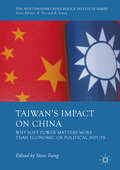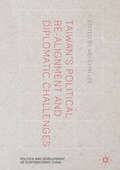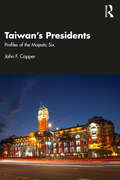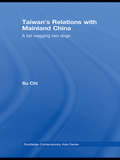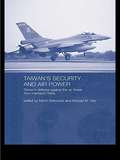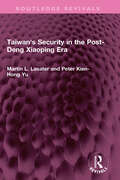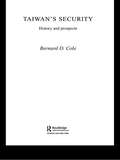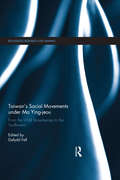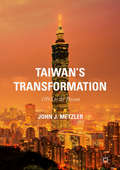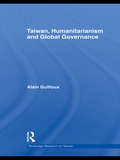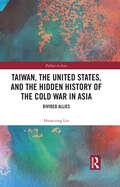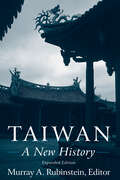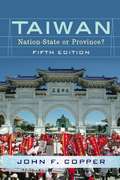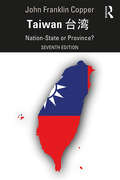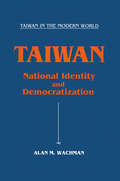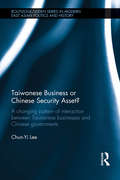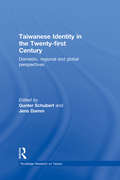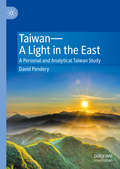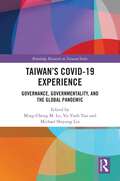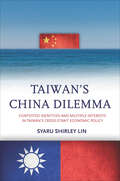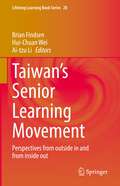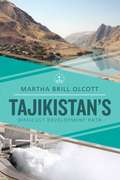- Table View
- List View
Taiwan's Impact on China
by Steve TsangThis book is about the basis and scope of impact that Taiwan - a democracy with a population of around 23 million - has on China, the most powerful remaining Leninist state which claims sovereignty over Taiwan and has a population of over 1. 3 billion. It examines how Taiwan has helped China in its economic transformation, but argues that the former exercises greatest influence through its soft power. The expert and timely contributions in this book demonstrate how Taiwan exerts real influence in China through admiration of its popular culture, be it in music or literature, as well as its reach into politics and economics. As mainland Chinese visit Taiwan, they are most impressed with civility in everyday living based on a modernized version of the traditional Chinese culture. However, discussions in the book also reveal the limits of Taiwan's impact, as the Chinese government tightly controls the narrative about Taiwan and does not tolerate any Taiwanese posing a threat to its monopoly of power.
Taiwan's Impact on China: Why Soft Power Matters More than Economic or Political Inputs (The Nottingham China Policy Institute Series)
by Steve TsangThis book is about the basis and scope of impact that Taiwan – a democracy with a population of around 23 million – has on China, the most powerful remaining Leninist state which claims sovereignty over Taiwan and has a population of over 1.3 billion. It examines how Taiwan has helped China in its economic transformation, but argues that the former exercises greatest influence through its soft power. The expert and timely contributions in this book demonstrate how Taiwan exerts real influence in China through admiration of its popular culture, be it in music or literature, as well as its reach into politics and economics. As mainland Chinese visit Taiwan, they are most impressed with civility in everyday living based on a modernized version of the traditional Chinese culture. However, discussions in the book also reveal the limits of Taiwan’s impact, as the Chinese government tightly controls the narrative about Taiwan and does not tolerate any Taiwanese posing a threat to its monopoly of power.
Taiwan's Political Re-Alignment and Diplomatic Challenges (Politics And Development Of Contemporary China Series)
by Wei-Chin LeeThis edited volume investigates and evaluates the context, causes, and consequences of various essential issues in Taiwanese domestic politics and external relations before and after the regime change in 2016. It offers theoretical interpretation and temporal delineation of recent electoral shifts, party realignment, identity reformulation, and subsequent foreign policy adaptation in the 2010s. Contributors address these issues in three sections—“Democracy and New Political Landscape,” “The China Factor and Cross-Strait Dilemma,” and “Taiwan’s International Way-out”—to advance conclusions about Taiwan’s political transformation from both comparative and international perspectives.
Taiwan's Presidents: Profiles of the Majestic Six
by John F. CopperThis book profiles Taiwan’s six key presidents—Chiang Kai-shek, Chiang Ching-kuo, Lee Teng-hui, Chen Shui-bian, Ma Ying-jeou, and Tsai Ing-wen—focusing on politics, economics, elections, successes and failures in office, popularity, and democratization.By analyzing criteria of the six presidents’ leadership, such as management of crises, advancing democracy, stewardship of the economy, charisma, corruption, and handling of foreign relations, especially with China and the U.S., John F. Copper goes on to rank the presidents and predicts trends and difficulties that future presidents will face. Special attention is paid to relations with the U.S., acknowledging the U.S. as Taiwan’s political and economic model as well as its being Taiwan’s protector in the context of China’s claim to Taiwan.As an assessment of these six political leaders as well as a study of Taiwan’s political system, this book will appeal to students and scholars of Taiwan, political science, and international relations.
Taiwan's Relations with Mainland China: A Tail Wagging Two Dogs (Routledge Contemporary Asia Series #7)
by Chi SuTaiwan's Relations with Mainland China is the first book to deal with the role of Taiwan’s leadership politics, including the personal political styles of Lee Teng-hui and Chen Shui-bian, in the development of Taiwan’s mainland policy and the consequences for U.S.-Taiwan relations. Including analysis of the critical and volatile 1988-2004 period, the Taiwan Straits crisis and cross-strait tension associated with the 2004 Taiwan presidential campaign, Su Chi weaves in his personal participation in Taiwan policy making during critical periods in Taiwan’s diplomatic history to provide insight and information on cross-strait relations that is not available elsewhere As a study of Taiwan’s mainland and US policy this will be a fascinating read for students and scholars of Taiwan Politics, Chinese Foreign Policy and East Asian Security studies alike.
Taiwan's Security and Air Power: Taiwan's Defense Against the Air Threat from Mainland China (Routledge Security In Asia Ser. #Vol. 1)
by Martin Edmonds Michael M. TsaiRecent concern about mainland China's intentions towards Taiwan, and more general concern about the risk of instability in the region, has led to growing interest in Taiwan's military strategy. This book brings together a range of experts from the West and from Taiwan itself who examine the key issues connected with Taiwan's air power, which is a k
Taiwan's Security in the Post-Deng Xiaoping Era (Routledge Revivals)
by Martin L. Lasater Peter Kien-Hong YuOriginally published in 2000, Taiwan’s Security in the Post-Deng Xiaoping Era analyses the many domestic and international factors comprising Taiwan’s security situation in the late 1990s and early 21st Century. The security of Taiwan remains of international strategic concern, and the military situation in the Taiwan Strait is increasingly volatile, nearly 25 years after this book was first published. This detailed study concludes that Taiwan’s overall security will become increasingly dependent on external factors and that the most important contribution Taipei can make to its own security, other than military preparation, is political astuteness.
Taiwan's Security: History and Prospects (Asian Security Studies)
by Bernard ColeThis is the first explanation and evaluation of Taiwan’s defence forces and infrastructure. It examines not only Taiwan’s armed forces, but also its Ministry of National Defence, personnel issues, and civil-military relations. This book provides crucial base-line data and evaluation of one of the major participants in an ongoing crisis across the Taiwan Strait that has the potential of involving China and the United States in armed conflict. It examines the danger of a possibly nuclear conflict between China and the United States which would seriously disrupt all of East Asia. It also shows how Taiwan’s defence policies and actions do not match the threat - Taipei needs to develop and pursue realistic policies. This is essential reading for all students of East Asian security and Sino-American relations and of international and security studies in general.
Taiwan's Social Movements under Ma Ying-jeou: From the Wild Strawberries to the Sunflowers (Routledge Research on Taiwan Series)
by Dafydd FellIn the spring of 2014, the Sunflower Movement’s three-week occupation of the Legislative Yuan brought Taiwan back to international media attention. It was the culmination of a series of social movements that had been growing in strength since 2008 and have become even more salient since the spring of 2014. Social movements in Taiwan have emerged as a powerful new actor that needs to be understood alongside those players that have dominated the literature such as political parties, local factions, Taishang, China and the United States. This book offers readers an introduction to the development of these social movements in Taiwan by examining a number of important movement case studies that focus on the post 2008 period. The return of the Kuomintang (KMT) to power radically changed the political environment for Taiwan’s civil society and so the book considers how social activists responded to this new political opportunity structure. The case chapters are based on extensive fieldwork and are written by authors from a variety of disciplinary backgrounds and methodological approaches; in some cases authors combine being both academics and activists themselves. Together, the chapters focus on a number of core issues, providing the book with four key aims. Firstly, it investigates the roots of the movements and considers how to best explain their emergence. Secondly, it examines the development trajectories of these movements. Thirdly, it looks at the best way to explain their impact and development patterns, and finally it assesses their overall impact, questioning whether they can be regarded as successes or failures. Covering a unique range of social movement cases, the book will be of interest to students and researchers interested in Taiwanese society and politics, as well as social movements and civil society.
Taiwan's Transformation: 1895 to the Present
by John J. MetzlerThis book presents a cogent but comprehensive review of Taiwan’s socio-economic transformation from a Japanese colony to a thriving East Asian mini-state. Since the 1980’s, Taiwan has primarily been viewed as a thriving economic model. Though certainly true, this assessment belies the amazing social and political success story for 23 million people on a small New Hampshire-sized island just off the China coast. Metzler highlights the engaging political narrative of democratization as well as Taiwan’s noteworthy accomplishments despite the proximity and opposition of communist China. Further, the result of the 2016 elections and its implication are analyzed. Scholars studying East Asia and policy makers will gain a greater appreciation for the island’s dynamic, prosperous resilience, despite pressure from China.
Taiwan, Humanitarianism and Global Governance (Routledge Research on Taiwan Series)
by Alain GuillouxIn this unique book, Alain Guilloux uses four major elements of governance - namely norms, actors, processes, and outcomes - to examine Taiwan’s national governance as well as its participation in global governance in relation to humanitarian aid. Including case studies on Taiwan’s application to become an observer to the WHO, and its foreign-aid policy and practice dealing with disease outbreaks and natural disasters, Guilloux explores the complexities and dilemmas of providing humanitarian aid to people in need and distress. Taking into account Taiwan's unclear status in the global arena, and how in its efforts Taiwan faces both international isolation and opposition from the People's Republic of China at multiple levels. Taiwan, Humanitarianism and Global Governance will be of interest for scholars of Chinese studies, Taiwan Studies, East Asian politics and International Relations, and environmental politics and humanitarian studies.
Taiwan, the United States, and the Hidden History of the Cold War in Asia: Divided Allies (Politics in Asia)
by Hsiao-Ting LinThis book explores the challenges which faced the United States and Taiwanese alliance during the Cold War, addressing a wide range of events and influences of the period between the 1950s and 1970s. Tackling seven main topics to outline the fluctuations of the U.S.–Taiwan relationship, this volume highlights the impact of the mainland counteroffensive, the offshore islands, Tibet, Taiwan’s secret operations in Asia, Taiwan’s Soviet and nuclear gambits, Chinese representation in the United Nations, and the Vietnam War. Utilizing multinational archival research, particularly the newly available materials from Taiwan and the United States, to reevaluate Taiwan’s foreign policy during the Cold War, revealing a pragmatic and opportunistic foreign policy disguised in nationalistic rhetoric. Moreover, this study represents a departure from previous scholarship, emphasizing the dictatorial and incompetent nature of the Chinese Nationalist regime, to provide fresh insights into the nature of U.S.–Taiwan relations. Presenting a revisionist view of one of the strongest bilateral relationships of the Cold War, this will be an insightful resource for scholars and students of Chinese and East Asia History, Cold War History, Asian Studies, and International Relations.
Taiwan: A New History
by Murray A. RubinsteinThis book explores Taiwan's development from its formal beginnings as a political entity to a home for a Ming-loyalist regime, to a Ch'ing prefecture and province, to its half-century as a Japanese possession, and to fifty years as the home of the Kuomintang-controlled Republic of China.
Taiwan: Nation-State or Province, 5e
by John F. CopperIn this newly revised and updated edition of Taiwan: Nation-State or Province? Professor John Copper examines Taiwan's geography and history, society and culture, economy, political system, and foreign and security policies in the context of Taiwan's uncertain political status: whether a sovereign nation or a province of the People's Republic of China. <P> Copper argues that Taiwan's very rapid and successful democratization suggests Taiwan should be independent and separate from China, while increasingly important economic links between Taiwan and China indicate the opposite. New to the fifth edition is enhanced coverage of the issues of an aging population, immigration, Taiwan's loss of diplomatic status, and its improving commercial--though not political--relations with China. The new edition also examines the implications of the recent Chen Shui-bian administration and the 2008 presidential election. A selected bibliography guides students in further research.
Taiwan: Nation-State or Province?
by John F CopperIn this newly revised and updated edition of Taiwan: Nation-State or Province?, John F. Copper examines Taiwan's geography and history, society and culture, economy, political system, and foreign and security policies in the context of Taiwan's uncertain political status as either a sovereign nation or a province of the People's Republic of China. Copper argues that Taiwan's very rapid and successful democratization suggests Taiwan should be independent and separate from China, while economic links between Taiwan and China indicate the opposite. New to the sixth edition is enhanced coverage of the issues of immigration; the impact of having the world's lowest birthrate; China's economic and military rise and America's decline; Taiwan's relations with China, the United States, and Japan; and the KMT's (Nationalist Party) return to power. The new edition will also examine the implications of the 2012 presidential election. A selected bibliography guides students in further research.
Taiwan: Nation-State or Province?
by John Franklin CopperIn this newly revised and updated seventh edition of Taiwan: Nation-State or Province? Copper examines Taiwan's geography and history, society and culture, economy, political system and foreign and security politics in the context of Taiwan's uncertain status, as either a sovereign nation or a province of the People's Republic of China. Analyzing possible future scenarios and trends that could affect Taiwan’s status, the author argues that Taiwan's very rapid and successful democratization suggests Taiwan should be independent and separate from China, while economic links between Taiwan and China indicate the opposite. New features to this brand-new edition include: The triumph of the Democratic Progressive Party (DPP) in the 2016 elections. The impact of the Trump administration on US–Taiwan relations. The rise of popularism. The shift in cross-Strait relations with China given their increased power on the world stage. This revised and fully up-to-date textbook will be essential reading for students of Taiwan, China, US–China relations and democracy.
Taiwan: National Identity and Democratization (Studies In Asian Security Ser. #45)
by Alan M. WachmanTaiwan has become a democracy despite the inability of its political elite to agree on the national identity of the state. This is a study of the history of democratisation in the light of the national identity problem, based on interviews with leading figures in the KMT and opposition parties.
Taiwanese Business or Chinese Security Asset: A changing pattern of interaction between Taiwanese businesses and Chinese governments (Routledge/Leiden Series in Modern East Asian Politics, History and Media)
by Chun-Yi LeeThis book investigates how China has used Taiwanese investment and treated Taiwanese investors to pursue political reunification. The book’s main supposition is that both Chinese central and local governments have strategic considerations with respect to Taiwanese businesses. Consequently, through detailed case studies of three cities: Tianjin, Kunshan and Dongguan, the author explores the changing interaction between Taiwanese businesses and the Chinese government, and seeks to provide an explanation of this changing pattern of interaction in the cross-strait political economy. Through her unique empirical research, Lee shows how Chinese local governments, although being driven by short-term goals, also contribute to the goal of achieving political reunification, and argues that central and local governments complement each other as a consequence. By stressing the importance of long-term political goals and the state’s policy interests and preferences, this research intends to address the various political implications attached to Taiwanese investment in China. This timely and important study presents some of the first systematic empirical research published in English (or any other Western language) focusing on Taiwan’s entrepreneurs (taishang) on the Chinese mainland. The book will be of interest to students and scholars of Taiwan Studies, Chinese Politics, Political Economy, Chinese Business and economics.
Taiwanese Identity in the 21st Century: Domestic, Regional and Global Perspectives (Routledge Research on Taiwan Series)
by Gunter Schubert Jens DammAs we look to enter the second decade of the 21st century, Taiwan’s quest for identity remains the most contentious issue in the domestic arena of Taiwanese politics. From here, it spills over into the cross-Strait relationship and impacts on regional and global security. Whether Taiwan is a nation state or whether Taiwan has any claim to be a nation-state and how Taiwan should relate to "China" are issues which have long been hotly debated on the island, although it seems that much of this debate is now more focused on finding an adequate strategy to deal with the Beijing government than on the legitimacy of Taiwan’s claim to sovereignty as the Republic of China. The collection of chapters in this book shed light on very different aspects of Taiwan’s current state of identity formation from historical, political, social and economic perspectives, both domestically, and globally. As such it will be invaluable reading for students and scholars of Taiwan studies, politics, history and society, as well as those interested in cross-Strait relations, Chinese politics, and Chinese international relations.
Taiwan—A Light in the East: A Personal and Analytical Taiwan Study
by David PenderyThis book is an analytical of study of Taiwan interspersed with personal elements from the author's life there in the last 20 years. Taiwan's unique confluence of colonial histories, Chinese nationalism and democratization offers a tangible alternative to the status quo in mainland China, albeit one that is becoming more marginal with time. With this in mind, the author offers a concise introduction to the politics and culture of contemporary Taiwan, investigating the Taiwanese identity, aesthetic and its future. A guide to navigating the coming years for Taiwan and greater China, this book will be of interest to scholars, political scientists and historians.
Taiwan’s COVID-19 Experience: Governance, Governmentality, and the Global Pandemic (Routledge Research on Taiwan Series)
by Yu-Yueh Tsai Michael Shiyung LiuThis book explores and develops the ongoing conversation about how Taiwan navigated through the COVID-19 pandemic.Emphasizing the themes of governance and governmentality, it moves the foci of the discussion from COVID policies to the social and political orders undergirding the statecraft of pandemic management. Furthermore, it analyzes how the pandemic fostered a historical moment at which new forms of governance and governmentality were beginning to take root. It also situates Taiwan’s precarious nationhood in its global context, thereby challenging a prevalent methodological nationalism – the assumption that the nation is a natural unit of analysis whose borders are more or less unquestioned – and contributing to decolonizing Western theories with perspectives from the Global South.Presenting rich original materials on the legal and public debates, individual reflections, and grassroots campaigns during COVID, this book will be essential reading for students and scholars of Taiwan's governance and social health policy, as well as medical anthropology and sociology.
Taiwan’s China Dilemma: Contested Identities and Multiple Interests in Taiwan’s Cross-Strait Economic Policy
by Syaru LinChina and Taiwan share one of the world's most complex international relationships. Although similar cultures and economic interests promoted an explosion of economic ties between them since the late 1980s, these ties have not led to an improved political relationship, let alone progress toward the unification that both governments once claimed to seek. In addition, Taiwan's recent Sunflower Movement succeeded in obstructing deeper economic ties with China. Why has Taiwan's policy toward China been so inconsistent? Taiwan's China Dilemma explains the divergence between the development of economic and political relations across the Taiwan Strait through the interplay of national identity and economic interests. Using primary sources, opinion surveys, and interviews with Taiwanese opinion leaders, Syaru Shirley Lin paints a vivid picture of one of the most unsettled and dangerous relationships in the contemporary world, and illustrates the growing backlash against economic liberalization and regional economic integration around the world.
Taiwan’s Senior Learning Movement: Perspectives from outside in and from inside out (Lifelong Learning Book Series #28)
by Brian Findsen Hui-Chuan Wei Ai-Tzu LiThis volume provides an in-depth analysis of historical and recent developments of senior learning in Taiwan, where publications in English have been scant. It takes a broader view on lifelong learning and active ageing from a theoretical/conceptual base written by prominent international authors- this represents the ‘outside in’ perspective. The ‘inside out’ on the other hand signifies an in-depth investigation of initiatives written by authors from Taiwan who are closely involved with developments in policy and practice. The volume is situated theoretically in the intersection of complementary concepts such as lifelong learning, active ageing, later life learning, learning communities and social movements. It is located geographically and culturally in East Asia where senior learning/education is expanding in response to large populations of older adults and concerns about their physical and social well-being. It is argued that Taiwan is leading the way in terms of innovation and community engagement in regard to older adult learning/education and can thus serve as a model for neighboring countries. By analyzing historical precedents, cultural dynamics, policy trends, research sub-fields and community engagement this book is of interest to both East Asian and Western scholars, practitioners, policy-makers and students amongst the fields of lifelong learning, social gerontology and educational psychology.
Tajikistan's Difficult Development Path
by Martha Brill OlcottTajikistan teeters on the brink of failure. This mountainous and landlocked country, the poorest in Central Asia, confronts the challenges of good governance and economic survival. These domestic struggles become even more problematic as international forces prepare to withdraw from neighboring Afghanistan, leaving Central Asian countries to ensure regional stability.In Tajikistan's Difficult Development Path, Martha Brill Olcott traces the political, economic, and social change following the country's independence and international efforts to avert state collapse. The Tajik government's commitment to reform has been inconsistent, and substantial foreign assistance provided since the end of the country's civil war has not led to the desired economic and political development.Olcott concludes that the Tajik leadership faces a serious dilemma: fully embrace reform or continue moving toward state failure. Tajikistan's decision will have very real implications for this troubled region.
Take Back Our Future: An Eventful Sociology of the Hong Kong Umbrella Movement
In a comprehensive and theoretically novel analysis, Take Back Our Future unveils the causes, processes, and implications of the 2014 seventy-nine-day occupation movement in Hong Kong known as the Umbrella Movement. The essays presented here by a team of experts with deep local knowledge ask: how and why had a world financial center known for its free-wheeling capitalism transformed into a hotbed of mass defiance and civic disobedience?Take Back Our Future argues that the Umbrella Movement was a response to China's internal colonization strategies—political disenfranchisement, economic subsumption, and identity reengineering—in post-handover Hong Kong. The contributors outline how this historic and transformative movement formulated new cultural categories and narratives, fueled the formation and expansion of civil society organizations and networks both for and against the regime, and spurred the regime's turn to repression and structural closure of dissent. Although the Umbrella Movement was fraught with internal tensions, Take Back Our Future demonstrates that the movement politicized a whole generation of people who had no prior experience in politics, fashioned new subjects and identities, and awakened popular consciousness.
